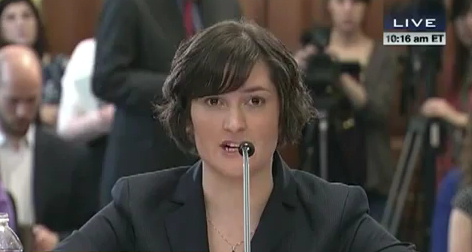 Every time we criticize the overhyped Sandra Fluke, somebody inevitably complains that if she’s so unimportant, we shouldn’t comment on her at all. That would be a fair point…if not for the fact that cable news networks keep pushing her commentary and lefty bloggers kept spreading it far and wide.
Every time we criticize the overhyped Sandra Fluke, somebody inevitably complains that if she’s so unimportant, we shouldn’t comment on her at all. That would be a fair point…if not for the fact that cable news networks keep pushing her commentary and lefty bloggers kept spreading it far and wide.
Last week, Mediaite’s Tommy Christopher fawned over the “reproductive freedom hero” for “crush[ing]” conservative Washington Examiner columnist Timothy Carney in a debate over ObamaCare’s contraception mandate on MSNBC’s All In with Chris Hayes. Of course, Christopher’s interpretation of the segment is only possible with, shall we say, generous helpings of willful obtuseness:
Hayes pointed out that “The employer here is saying their freedom is being impinged because the Affordable Care Act requires them to pay for insurance that gives birth control without a co-pay,” adding that “not giving that, right, has some encroachment on the freedom of the employee.”
“I don’t see that as having any encroachment on the employee, because the employee is perfectly free to go out and by his or her own birth control separately,” Carney replied, then made his odd comparison with Alec Baldwin’s anti-gay slurs. “You at MSNBC, you infringe on your hosts’ right to go out and make anti-gay comments in their personal lives, and I think it’s great that you make those decisions.”
This seems to be Christopher’s primary fixation. That’s the detail featured in his title, and Christopher takes Carney’s repetition of it to somehow mean his case against the mandate was “easily derailed.” Most amusingly, he’s impressed that Fluke “in short order had him comparing” the two even though Christopher’s own summary shows Carney was responding to Hayes, not Fluke. It’s okay, Tommy. I gave my high-school crush undue credit for stuff too. Except I was, y’know, in high school and not an adult editor of a professional website.
Smitten Tommy has a lot riding on the absurdity of “comparing contraceptive coverage with Alec Baldwin calling a photographer a ‘c***sucking f**got,’” as if Carney called them equally deplorable. That would be absurd…if Carney had said anything of the sort. But he was comparing the line between an employee’s freedom and an employer’s obligations in both situations, not the acts themselves.
The First Amendment protects Baldwin’s right to be a crass jerk, but as his employer, MSNBC had no obligation to keep him on the payroll while exercising it in ways they disliked. Similarly, consenting adults are free to have all the sex they want in private, and use whatever (non-abortive) contraceptive methods they want, but it doesn’t follow that their employers owe them help doing so.
Just as MSNBC’s personalities sign up agreeing not to publicly embarrass them (I know, I didn’t think MSNBC was capable of embarrassment either), employees take jobs agreeing to certain pay and benefits. Employers may be legally forced to honor the terms of that agreement if they renege, but not to spend their money on brand-new terms.
According to Christopher, Fluke refuted that with this “devastating point”:
It goes even beyond health care. It’s a corporation picking and choosing which types of laws they want to comply with. And our belief in this society has always been that we protect the religious liberty of individuals in their private lives, but that when you cross that line and go into the public sphere and decide you want to operate as a company, make a profit off of the public, you need to abide by the public’s laws.
With legal analysis like this, Georgetown got ripped off on Fluke’s public-interest scholarship. First, there’s a reason employers like Hobby Lobby and Liberty University are “picking and choosing” to resist these laws: they’re blatantly unconstitutional. Not only does the Constitution give the feds no authority to impose these mandates in the first place, but it also protects the religious from compulsory participation in practices against their beliefs.
And as for this nakedly totalitarian idea that people check their religious liberty at the door, Fluke simply pulled it out of thin air. Does anyone seriously believe the Founding Fathers imagined they were leaving such a wide, easily exploitable loophole in their new Constitution’s religious freedom protections? The First Amendment says nothing about any public/private or profit/nonprofit distinctions, and it’s hard to pin suggesting otherwise on anything but intentional dishonesty.
Carney noted this when he asked:
Chris, right now you and I are putting our opinions out on television. You are making money on this, I am not. Would it be okay for the federal government to say “Chris is in business on TV, so we’re going to infringe on his First Amendment rights, but Tim and Sandra, they’re just doing this non-business…”
And he elaborated in his November 30 column:
It’s not a novel claim, but it’s still a scary one: A person gives up his First Amendment rights when he is acting as a businessman.
The underlying logic here is this: A for-profit corporation — even a privately held one — cannot be permitted to serve a religious purpose, or presumably any other purpose besides profit. In other words, the administration is arguing that the only legitimate aim of a corporation is profit — and, interestingly, the Left is rallying behind this viewpoint.
For megacorporations, this isn’t a problem. General Electric and Pfizer basically operate strictly for profit already. Publicly traded corporations have so many shareholders that it would be pretty hard to discern any shared aim other than profit.
So this Obama administration crusade for separation of commerce and conscience restricts the freedom only of family businesses, which is good for their bigger competitors.
Unfortunately, Christopher was apparently too busy swooning at Sandra to process Carney’s obvious logic, so instead of addressing it, he lazily dismissed it as a “desperate rejoinder” which “so flummoxed” Hayes “that he hardly knew where to begin.” The only thing reeking of desperation here is how thick Christopher’s laying on adjectives that he doesn’t back up with analysis. Here’s the closest he comes to substance:
[T]he fundamental weakness (of many) in that argument is that Chris Hayes is not a business (or even the owner of the business), just as NBC/Universal is not a person. All the rhetorical acrobatics in the world won’t change that, and as Fluke pointed out, businesses don’t have the same rights of expression as individuals.
It’s depressing how much mileage liberals get out of pretending something as simple as corporate personhood is incomprehensibly weird. Nobody claims a business is a person, but a business is people – a group of people joined together for common interests. And just because they’re exercising their rights collectively doesn’t mean they’re not rights anymore, or the Constitution stops applying to them.
What is so often missing from the contraception debate is the idea of equal protection under the law, the selective denial of necessary medical coverage to only one gender, and the fact that these businesses aren’t paying for contraception, the employees are. Health insurance is not some gift given out of benevolence, it is part of an employee’s compensation, so all Sandra Fluke is asking for is that the insurance she has earned is equal to that of every other American’s.
That’s a recitation of half-baked feminist legal theory, not sound application of equal protection. Political equality demands equally respecting both sexes’ natural rights to life, liberty, and property, not violating one person’s liberty and property rights to compensate for the unequal circumstances biology gives another person.
Tommy Christopher takes the exchange as “a very good sign for reproductive freedom, and for the religious freedom of women in the workplace.” I take the fact that such lazy rationales for stifling liberty can be hailed as victories for liberty as proof of the old adage about freedom being fragile – “never more than one generation away from extinction,” in Ronald Reagan’s words. When it’s not taught with real care and historical perspective, it is frighteningly vulnerable to subversion by any number of feel-good, paper-thin platitudes.







